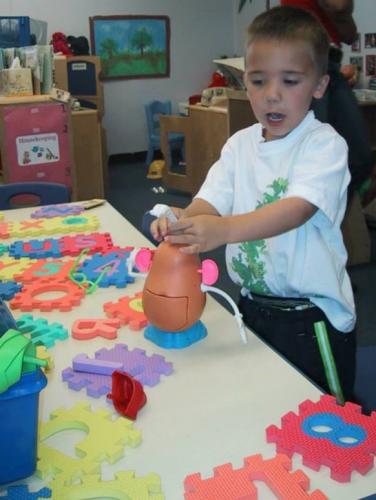Examining Interactions as a Measure of Classroom Community:
Insight Into the Inclusion of Autistic Learners within General
Education Mathematics Lessons
 Authors:
Sparapani, N. Tseng., N, Ferrer, E., Mundy, P. (in preparation)
Authors:
Sparapani, N. Tseng., N, Ferrer, E., Mundy, P. (in preparation)
Examining “Inclusion” for Students on the Autism Spectrum in
Early Childhood and Elementary Classrooms: A Systematic Review
Authors: Birkeneder, S., Sparapani, N., Murphy,
C., Parks., C. (in preparation)
Teachers’ Perceptions of Executive Functioning and Challenging
Behaviors in a Sample of Autistic Students and Their Peers
This study examines group differences in teacher-reported
executive functioning (EF) and challenging behaviors between
their autistics and non-autistic students (with and without other
disability classification). Teachers reported EF challenges in
their autistic students and students with other disability
classifications. These EF challenges were associated with
challenging behaviors for all students but strongest for students
with other disability classifications.
Authors: Nunnally, A.D., Birkeneder, S.,
Bullen, J., Vega Garcia, J. Parks, C., Tseng N., Mundy, P.,
& Sparapani, N.
Examining Executive Functioning Skills and Reading Achievement
Among a Sample of Neurodiverse Elementary Students within General
Education Classrooms
 Executive functioning (EF) skills
are a set of cognitive processes that regulate our ability to
start, manage, and carry out goals. This study examined
differences in EF profiles and reading outcomes among a sample of
neurodiverse children within TK-5th grade general education
classrooms. Our findings highlight the nature of and
variability in EF skill
development and suggest that EF might play a
significant role in explaining differences in reading between
neurodivergent learners and their neurotypical peers.
Executive functioning (EF) skills
are a set of cognitive processes that regulate our ability to
start, manage, and carry out goals. This study examined
differences in EF profiles and reading outcomes among a sample of
neurodiverse children within TK-5th grade general education
classrooms. Our findings highlight the nature of and
variability in EF skill
development and suggest that EF might play a
significant role in explaining differences in reading between
neurodivergent learners and their neurotypical peers.
Authors: Parks, C., & Sparapani, N.
Linking Observable Self-Regulatory Behavior with Biophysical
Measures of Stress in a Sample of 15- to 22-Year-Old Males with
Fragile X Syndrome
Individuals with fragile X syndrome (FXS) report higher rates of
anxiety, which have been attributed to challenges in Emotion
Regulation (ER). This study examined the construct validity
of an observational measure of ER as outlined in the
Classroom Measure of Active Engagement (CMAE)
by examining associations with salivary alpha-amylase (SAA)
readings, a physiological measure of anxiety. Participants
included 28 males (Mage = 19.02) with FXS who
were recruited as part of a longitudinal study.
Authors: Alexander, C., Towers, L., Sparapani,
N., Nunnally, A.D., Thurman, A., Abbeduto, L.
Differences in Instructor Responsiveness and Student
Participation between Special Education Teachers and Classroom
Paraprofessionals Serving Preschool-3rd Grade Students on
the Autism Spectrum
 This study utilized an
archival dataset of classroom video observations of
paraprofessionals and teachers working with
preschool-3rd grade students on the autism spectrum. Videos
had been coded for student and teacher behaviors as part
of The Classroom Measure of Active
Participation (Class-MAP; Sparapani et al., unpublished
manual). A subset of 30 observations were examined to investigate
the responsive language that teachers and paraprofessionals used
during classroom activities. We found that teachers
used significantly more responsive language than
paraprofessionals.
This study utilized an
archival dataset of classroom video observations of
paraprofessionals and teachers working with
preschool-3rd grade students on the autism spectrum. Videos
had been coded for student and teacher behaviors as part
of The Classroom Measure of Active
Participation (Class-MAP; Sparapani et al., unpublished
manual). A subset of 30 observations were examined to investigate
the responsive language that teachers and paraprofessionals used
during classroom activities. We found that teachers
used significantly more responsive language than
paraprofessionals.
Authors: Towers & Sparapani, in preparation for
publication
Child Factors Related to Expressive Language Abilities of
Children with Down Syndrome
This study analyzed factors related to expressive language
development in young children with Down syndrome. Results
indicated that children’s verbal short-term memory and nonverbal
reasoning was associated their vocabulary size, while children’s
autism symptomatology, vocabulary size and nonverbal reasoning
abilities were associated with their highest expressive language
milestone. Lastly, children’s vocabulary size was found to
mediate the association between verbal short-term memory and
children’s highest expressive language milestone.
Amanda D. Nunnally and colleagues, in preparation for publication